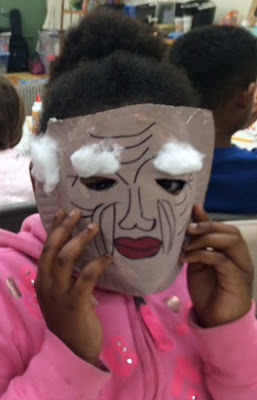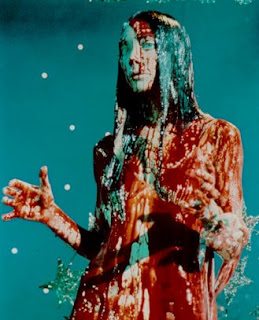White Bias or Snow Black?
Last month on Anderson Cooper 360, the suave, silver fox news hunk introduced a pilot study helmed by CNN called "Kids on Race." Black and white children from two different age groups were shown the above picture and asked questions like, "Which is the good child?" "Which is the ugly child?" "Which child do adults like?"
This was based on an experiment administered in the forties. Instead of the cartoon rainbow coalition shown above, however, children chose between black and white baby dolls, the findings of which were used in the landmark case, Brown vs. Board of Education. Sadly, although perhaps not surprisingly, sixty-three percent of black kids wanted to play with the white doll rather than the one they themselves resembled.

In the Obama era it was hoped that the findings of the newly administered test wouldn't show such white bias. That our country's first African American president would raise self-esteem among black kids and awareness in white kids.
Of course, white bias exists in this country. For me, that truth resounded more once I had a black daughter. It's not always easy surrounding her world with positive role models when she is constantly being inundated with perky, blond imagery.
For instance, Maxwell (she made a recent proclamation that she prefers that to Maxie) loves the Disney princesses and she glows with pride when talking about Princess Tiana, the titular African American character in The Princess and the Frog. But more often than not, the Disney princesses represented on packaging from DVDs to sleepwear are alabaster white. Cinderella, Snow White, Belle, Aurora and Ariel preen beautifically on tee shirts and plastic tiaras, but if a princess of color is invited to join their merry group, she is usually situated off to the side or shoved to the back.
I was actually amazed how easy it was to prove this point. I typed disney princesses images in my Google search box, and take a gander at the first picture that popped up...

Poor Princess Jasmine can barely find elbow room among all that Caucasian-ness. And there's no sign of her melanin endowed sisters, not Tiana, Pocahontas nor Mulan (not really a princess, but oftentimes represented as one.) It's tokenism pure and simple, and day after day my daughter is subjected to such inequalities.
Hold on to your hat. I just had one of those flashes of yore, a blast from my past; a photo from a glossy TV mag. A picture of a different group of princesses entirely...

...situated off to the side or shoved to the back.
One image from a nighttime soap circa mid-eighties, the other from a Disney clip art site dated 2010. How much have we really changed? Tokenism is alive and well and Diahann Carroll for one does not seem at all pleased.
Our television shows, our movies, our advertisements, and, yes, even the Rockettes during the Macy's Thanksgiving Day Parade are chalk full of chalk white faces. Sometimes a lone person of color will be included making the sea of white seem even more glaring. Of course, I was thrilled when Princess Tiana came along, as was I thrilled with the timing of Princess Sasha and Princess Malia entering the White House. Sistahs for my daughter to look up to. But for every Dora the Explorer and Kai-lan there's an awful lot of Wonder Bread out there, spread thick with mayonnaise.
So, yes, white bias is alive and well in our fair land. That being said, however, I'm not sure the CNN test accurately proves that fact.
A bit of trickery was involved, meaning there is no appropriate answer to "Which is the ugly child?" Some of the older kids who were administered the test could articulate that none of the cartoon children were smarter or more beautiful. Some even went on to say, "It's what's on the inside that counts." But the younger ones, the little four and five year olds, those who have yet to reach the age of reason, didn't have the life experience necessary to help them navigate through the trap. And I question whether their answers really support the institutionalized racism CNN was trying to prove.
If the kids tested are anything like my kids, then two things... Four and five year olds blindly trust authority figures, and if they don't know an answer, they make shit up. So, when an authority figure asks a young one, "Which is the good child?" then to their little, guileless minds one of those five cartoon figures must be the good child because an adult says so. And since there is no correct answer, what's the kid going to do but guess. When Sebastian was younger, he loved guessing. "What's one plus one?" I'd ask, and immediately Bash would offer, "Five." "What color is a fire truck?" "Green."
The difference is what's one plus one has an absolute answer, as does what letter comes after Q, or is it proper to wear white after Labor Day? But which is the smart child is a trick question.
I imagine that my five year old self would have given the white cartoon all the favorable characteristics. I positively identified being white, so why wouldn't I have chosen Whitey McWhitenstien to be the beautiful, the smart and the good?
I imagine that my five year old self would have given the white cartoon all the favorable characteristics. I positively identified being white, so why wouldn't I have chosen Whitey McWhitenstien to be the beautiful, the smart and the good?
One mother was shocked when her white son labeled the caricature with the darkest skin as ugly, bad, and dumb. The thing is, I see my five year old self doing the same thing, choosing the image that is most not like me, the one at the opposite end of the color spectrum. Is this really racism or a strong dose of positive self esteem?
I can only wonder if the experiment would have been less sensational if the children were offered the option does not apply.
The heart breaking moment was watching a beautiful black girl with a smile to melt your heart, say she thought the black cartoon was the ugly one. When Anderson Cooper questioned her in a later moment, she said point blank, she thought the color of her skin was nasty.
This prompted me to find out if my two ragamuffins with their two different pigmantations would support the white bias identified by CNN. I asked them which skin tone they found more beautiful, my white son said "black skin" without hesitation, which was then echoed by my black daughter. What seemed devastating on television, a black girl not choosing her own skin color, was downright endearing when Sebastian chose his sister's skin color rather than his own.
Then as a follow up, I asked Maxie, I mean Maxwell, the rest of the questions and systematically she went down the line, labeling the cartoon images in order, irregardless of color. (The stupid child was the first image, the smart child was the second image, and so on.) The only time she deviated from her methodology was when I circled back to the word beautiful. Then she always pointed to the darkest of the drawings. I love that Maxwell loves the color of her skin (she prefers to call it brown rather than black.) And I love that she insists on going out with her hair plain, which means natural, no pigtails, no braids, no frills. She has a strong sense of self at such a young age, and I hope she'll stay strong even with the constant bombardment of lily white imagery that will most surly be a part of her life.
Perhaps my own bias keeps me from seeing the validity of this test. Perhaps we all need to talk about race more openly. Perhaps I'd think the findings more significant if instead of asking, "Which is the stupid child?" the questions were posed this way, "Do you see a stupid child? Which one is it?"

Bottom line, one plus one equals two, white is not to be worn after Labor Day, and one black Rockette in a Macy's Thanksgiving Day Parade is not integration.
Parting image: my daughter this Halloween...





Comments
Not sure what my point is here. But my daughter never even NOTICED that her two good friends were half Japanese until she was seven or eight.
I was glad that day in her class when she didn't assume that her dad was white--she had to ask me.
You make great points in your post. Great Halloween photo!!
Nice piece--well articulated about something most people just keep sticking under the rug.
The other day, my five-year-old son was watching TV and wanted to point something out to me on a commercial. This particular commercial featured several people, only one of which was black. I was so happy inside when he identified her not as "the black lady," but as "the lady with the brown hair." Such a simple statement ... but it said so much!